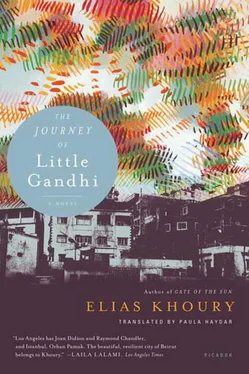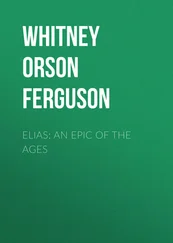“God forgive everyone, but tell him to get off my back.”
“Be patient, man,” the Reverend said.
“God grant you a long life, Reverend. You all speak English. I don’t understand a word. What’s-his-name starts speaking Arabic like he’s speaking English. I don’t understand a word, I …”
Gandhi laughed and his hands finished the sentence for him.
The Reverend Amin agreed. He wanted Gandhi, but he hated this sort of simplicity the Americans are good at putting on. He hated simplicity when it came to his wife, Eugenie, for she always spoke cautiously, twisting her jaws in order to prevent the letter alef from sounding mellow the way everyone in Beirut pronounced it. She’d lower her voice and put her hand over her mouth to hide her smile. Yet, in spite of her meekness and simplicity, she hated the poor, despised them. As for the Reverend Amin, he hadn’t visited his brothers and sisters for some time. His mother had died, and his cobbler brother had immigrated to Saudi Arabia. His second brother fled from Tiberias when Palestine fell and lived in the family house. Madame Eugenie, however, didn’t care for him or his wife and children, because they were like poor people’s children.
Amin agreed, for he no longer knew how to talk to his brother, or any of his relatives for that matter. He’d become like his wife’s family, raising the alef and speaking English and forgetting.
Gandhi told the Reverend Amin to forget it. “Forget the whole thing. If you don’t want me, I’ll pick up my shoe-shine box and go. God’s world is a big place, you know.”
The Reverend Amin didn’t say anything. He told him not to go and explained about the bearded young man and why the people got mad at him.
“This guy had just come from America. He studied philosophy and wanted to prove how smart he was.”
“But I can’t,” Gandhi said.
“You’re right, my son. I can’t either. Don’t be upset.”
Gandhi agreed to forgive the bearded young man and forgive him his sins, and to stop spitting on the ground whenever he saw him walking in the streets.
The bearded young man was a spy. That’s what Madame Nuha Aoun told him as she gave him her black-and-white shoe with the perforations; the one Gandhi had such a hard time polishing and would save for the end so he could take his time with it.
“He’s a spy, Mr. Gandhi,” Nuha said. “They’re all spies. But their days are numbered. Soon France will come to our rescue and save us from all this garbage.”
Gandhi wasn’t sure if she was talking about the Reverend Amin and his friends or the Americans who were all over Bliss Street with their shorts and their dogs.
All of that was over. Time passed by all of them like the blinking of an eye. The Americans left and the Reverend Amin started wetting his pants, and his church had been transformed into a warehouse for al-Munla and his gang. Zaylaa was the one who made the decision. After everything was stolen from the church immediately after an armed battle between the various organizations in the area on the fifth and sixth of June 1980, which led to a lot of destruction, misfortune, and looting, Zaylaa, who was king of the hill, decided the church could be used for a number of purposes. He gave it to al-Munla to use as a storage space for clothes Abu Saeed was importing from Hong Kong and Taiwan and selling as European goods.
Alice said the Reverend’s condition had deteriorated strangely. She said she saw him the previous Sunday — that was Sunday, the seventh of July, 1980. The Reverend Amin walked aimlessly in the streets. His pants were dirty and nearly falling off of him. He walked, carrying a black book. I saw him, she said. I saw him open the door of the church with his long key and go in. He left the door open and walked over the piles of pants and shirts. He stopped in front of the pulpit, opened his book, and started reading things about Jerusalem and the prophets.
“O Jerusalem, Jerusalem, thou that killest the prophets and stonest them which are sent unto thee, how often would I have gathered thy children together, even as a hen gathereth her chickens under her wings, and ye would not!
“Behold, your house is left unto you desolate. For I say unto you, ye shall not see me henceforth, till ye shall say, Blessed is he that cometh in the name of the Lord.”
He read and read, and his voice was very soft. His face hung loose and his legs quivered. He sat as if he were falling onto the edge of his old pulpit and started to cry. That was after the whole thing with Lillian Sabbagha, and after everyone had gone. Alice said she went in, took him by the hand, and tried to lead him home. But he walked to the front of Our Lady Church and there he held onto the railing as if he didn’t want to let go. He started praying in a loud voice.
From that day on, the man started falling apart. He became delirious and spent most of his time inside Our Lady Church. Father John tried to calm him down and asked Alice to take him home. Only Alice was left; she took him herself to the nursing home and returned with a pallid face and eyes swollen from crying so much.
In the Salonica Hotel, Alice burst into a fit of laughter and the Egyptian owner thought she’d gone crazy.
“What’s happened to you, Alice?”
“I’m laughing at myself, and this world. Who’s going to be there to take care of me when it’s my turn?”
No one took care of her. When the war broke out again on February 6, 1984, and the business district transformed into a theater of destruction, Alice disappeared. We didn’t hear anything about her. Did she die, or did she go to some unknown place? Did someone take care of her, or was she left, alone, in the middle of the destruction?
Whenever Alice talked about her memories, she’d lean on her right hand and let herself slip away. I saw her, and she was always like that. When she spoke she’d slip away to I don’t know where.
“Life is like the bracelet, my son. When he came with the scissors to cut the bracelet, I laughed. He got the scissors and broke it. When I saw it there on the ground, I broke into tears, and he started laughing. I was young and didn’t know anything. He was laughing and I was standing in front of him, crying. He told me that’s enough, get up, take a shower and get dressed, we have to go. I took a shower and got dressed and went, and I’m still going. His name was Abu Jamil. An impresario, you know, the guy who works everything out. He’d talk to the nightclub owner and fix the price; his word was final. I went when he cut the bracelet. Life is like the bracelet. Look. Look right now and tell me what you see.”
She raised her hand up, and I heard a rattling sound. I saw the black sleeve roll down over her wrist, revealing a collection of silver bracelets, some thin, some wide.
“I sold all my bracelets and bought new ones. This place “The Montana,” it’s not a bar, it’s a whorehouse. And Zaylaa isn’t anywhere near al-Askary. And men these days aren’t men. And I am not myself. Get up, my son, get up. You never told me who you were, who your father is.”
I was sitting with her in her room at the Salonica Hotel. The walls were red and peeling so badly they looked as though they hadn’t been scraped for a thousand years. She was sitting on the edge of the only bed, which was plopped in the middle of the empty room. Next to her was a small kerosene stove she used for making coffee and boiling potatoes. I was sitting on a chair stripped of its bamboo with my cheek against my hand, and my hand propped up on my knee, trying not to miss a single word.
“Who are you? From what family? You haven’t told me.”
“I’m related to Madame Sabbagha. Her mother is my father’s mother’s sister.”
Читать дальше












